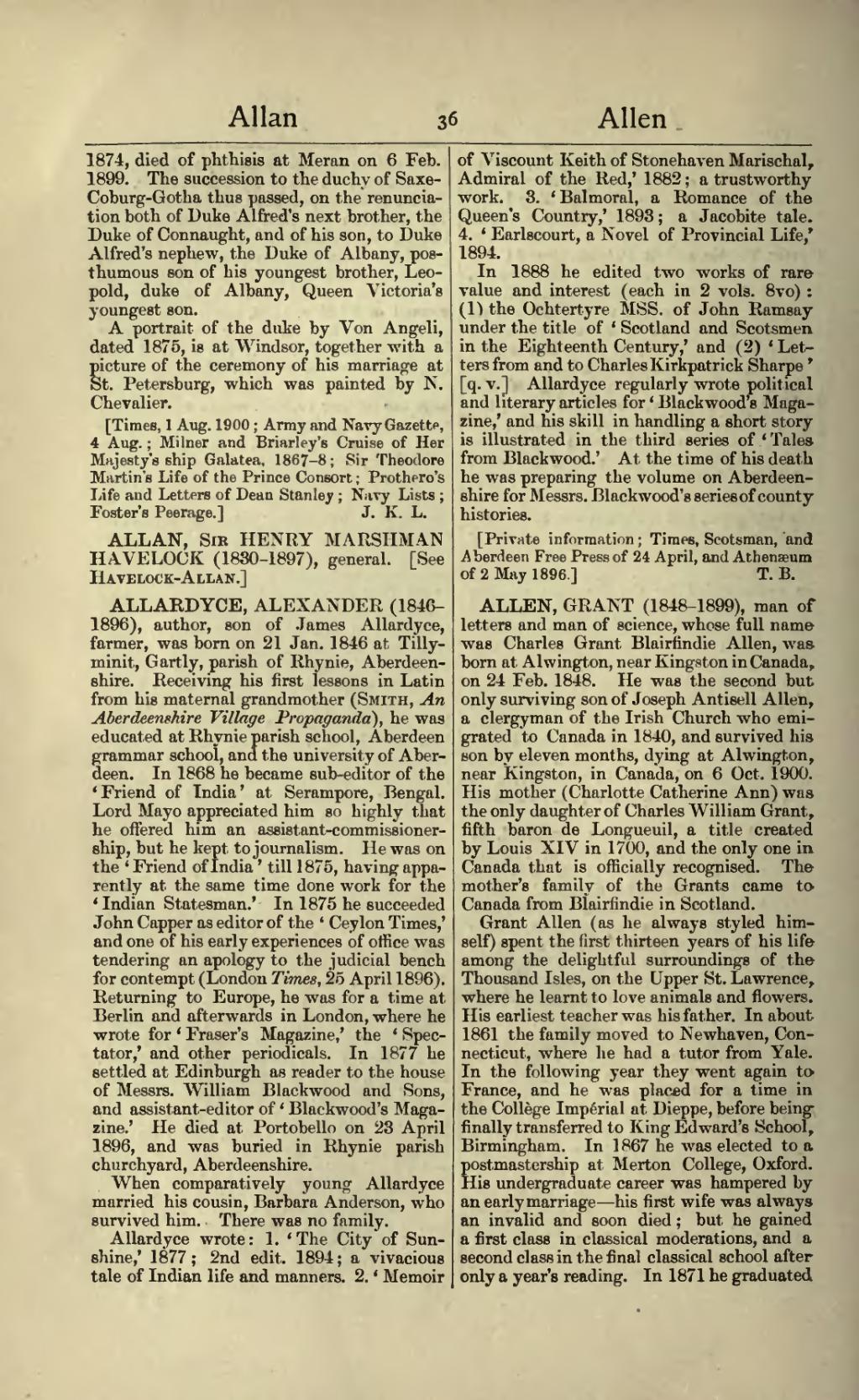1874, died of phthisis at Meran on 6 Feb. 1899. The succession to the duchy of Saxe-Coburg-Gotha thus passed, on the renunciation both of Duke Alfred's next brother, the Duke of Connaught, and of his son, to Duke Alfred's nephew, the Duke of Albany, posthumous son of his youngest brother, Leopold, duke of Albany, Queen Victoria's youngest son.
A portrait of the duke by Von Angeli, dated 1875, is at Windsor, together with a picture of the ceremony of his marriage at St. Petersburg, which was painted by N. Chevalier.
[Times, 1 Aug. 1900; Army and Navy Gazette, 4 Aug.; Milner and Briarley's Cruise of Her Majesty's ship Galatea, 1867-8; Sir Theodore Martin's Life of the Prince Consort; Prothero's Life and Letters of Dean Stanley; Navy Lists; Foster's Peerage.]
ALLAN, Sir HENRY MARSHMAN HAVELOCK (1830–1897), general. [See Havelock-Allan.]
ALLARDYCE, ALEXANDER (1846–1896), author, son of James Allardyce, farmer, was born on 21 Jan. 1846 at Tilly-minit, Gartly, parish of Rhynie, Aberdeenshire. Receiving his first lessons in Latin from his maternal grandmother (Smith, An Aberdeenshire Village Propaganda), he was educated at Rhynie parish school, Aberdeen grammar school, and the university of Aberdeen. In 1868 he became sub-editor of the 'Friend of India' at Serampore, Bengal. Lord Mayo appreciated him so highly that he offered him an assistant-commissionership, but he kept to journalism. He was on the 'Friend of India' till 1875, having apparently at the same time done work for the 'Indian Statesman.' In 1875 he succeeded John Capper as editor of the 'Ceylon Times,' and one of his early experiences of office was tendering an apology to the judicial bench for contempt (London Times, 25 April 1896). Returning to Europe, he was for a time at Berlin and afterwards in London, where he wrote for 'Fraser's Magazine,' the 'Spectator,' and other periodicals. In 1877 he settled at Edinburgh as reader to the house of Messrs. William Blackwood and Sons, and assistant-editor of 'Blackwood's Magazine.' He died at Portobello on 23 April 1896, and was buried in Rhynie parish churchyard, Aberdeenshire.
When comparatively young Allardyce married his cousin, Barbara Anderson, who survived him. There was no family.
Allardyce wrote:
- ‘The City of Sunshine,’ 1877; 2nd edit. 1894; a vivacious tale of Indian life and manners.
- ‘Memoir of Viscount Keith of Stonehaven Marischal, Admiral of the Red,’ 1882; a trustworthy work.
- ‘Balmoral, a Romance of the Queen's Country,’ 1893; a Jacobite tale.
- ‘Earlscourt, a Novel of Provincial Life,’ 1894.
In 1888 he edited two works of rare value and interest (each in 2 vols. 8vo): (1) the Ochtertyre MSS. of John Ramsay under the title of ‘Scotland and Scotsmen in the Eighteenth Century,’ and (2) ‘Letters from and to Charles Kirkpatrick Sharpe’ [q. v.] Allardyce regularly wrote political and literary articles for ‘Blackwood's Magazine,’ and his skill in handling a short story is illustrated in the third series of ‘Tales from Blackwood.’ At the time of his death he was preparing the volume on Aberdeenshire for Messrs. Blackwood's series of county histories.
[Private information; Times, Scotsman, and Aberdeen Free Press of 24 April, and Athenæum of 2 May 1896.]
ALLEN, GRANT (1848–1899), man of letters and man of science, whose full name was Charles Grant Blairfindie Allen, was born at Alwington, near Kingston in Canada, on 24 Feb. 1848. He was the second but only surviving son of Joseph Antisell Allen, a clergyman of the Irish Church who emigrated to Canada in 1840, and survived his son by eleven months, dying at Alwington, near Kingston, in Canada, on 6 Oct. 1900. His mother (Charlotte Catherine Ann) was the only daughter of Charles William Grant, fifth baron de Longueuil, a title created by Louis XIV in 1700, and the only one in Canada that is officially recognised. The mother's family of the Grants came to Canada from Blairfindie in Scotland.
Grant Allen (as he always styled himself) spent the first thirteen years of his life among the delightful surroundings of the Thousand Isles, on the Upper St. Lawrence, where he learnt to love animals and flowers. His earliest teacher was his father. In about 1861 the family moved to Newhaven, Connecticut, where he had a tutor from Yale. In the following year they went again to France, and he was placed for a time in the Collège Impérial at Dieppe, before being finally transferred to King Edward's School, Birmingham. In 1867 he was elected to a postmastership at Merton College, Oxford. His undergraduate career was hampered by an early marriage—his first wife was always an invalid and soon died; but he gained a first class in classical moderations, and a second class in the final classical school after only a year's reading. In 1871 he graduated
